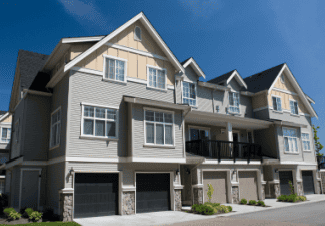Which Rental Property Flooring Is Best For You And Your Tenants?

The maintenance checkup this week provided by Keepe focuses on flooring to be sure you are your protecting your investment and income as well as keeping your tenants happy.
Flooring is the first thing that rental applicants see during a showing of a rental property so which rental property flooring is right?
Rental property flooring choice is the equivalent of curbside appeal for homeowners.
Renters are motivated by different attributes than homeowners, so luxury or cost are not the only attributes to consider when making a choice of flooring. It is also important to consider which segment of the rental market the property at hand is targeting.
For example, it may not make sense to install low-cost vinyl flooring if the location and finish of the property is more attuned to the high-end renter. That said, when it comes to rental property flooring options, there are a few technical attributes that are important to consider.
Rental property flooring basics
There are four basic types when you are selecting flooring:
- Hardwood
- Laminate
- Carpet
- Vinyl
Also, you can take into consideration various criteria when comparing the available flooring options:
- Variety
- Ease of installation
- Maintenance
- Softness
- Durability
- Resale or releasing value
- Eco-friendliness
- Affordability.
Here are some pros and cons for different rental property flooring options
Rental Property Hardwood Flooring Pros
- Variety: You can find hardwood flooring in a variety of colors, patterns (strip flooring, plank flooring, parquet flooring), width and thickness.
- Maintenance: Hardwood is easy to maintain and it can be re-sanded and refinished several times to remove stains and scratches. With a new refinish you can change the color of your hardwood using a different stain.
- Durability: Hardwood floors are durable, so it cannot be damaged easily. You can also place heavy furniture on it without any damage. Contribution to the resale value of your rental: Hardwood floors increase the sale value of your rental a lot, so if you think that you will sell the rental in a few years, it’s worth installing hardwood floors.
Hardwood flooring cons
- Ease of installation: Hardwood is not as easy to install as the other options, so a professional is needed to do the job and it is an expensive installation because it includes laying the floor, sanding, staining and finishing.
- Softness: Hardwood floors are not soft so it might not be the first option if you have kids and/or older people in the house.
- Eco-friendliness: Cutting forests is not an eco-friendly activity, so if you are green and love nature hardwood floors are not a choice.
- Affordability: Hardwood is an expensive choice for rental property flooring and the right fit for more upscale rentals.
Laminate flooring pros
- Variety: Since laminate flooring mimics hardwood, you can also find it in a variety of colors, patterns types, width and thickness for your rental property flooring.
- Ease of installation: Laminate floors (especially the snap-on ones) are easy to install so this can be an excellent DIY project.
- Maintenance: Laminate floors are easy to clean and require low maintenance.
- Affordability: Laminate flooring is an inexpensive choice. Prices may vary with quality but all in all it is a more affordable choice
Laminate flooring cons
- Softness: Laminate floor is not a soft surface.
- Eco-friendliness: Laminate is not an eco-friendly option being manufactured with toxins and resins. So, you can have off-gassing with laminate flooring not recommended for people with allergies and respiratory problems.
- Durability: Laminate floors can scratch easily, and damaged by heavy furniture. The only way to repair it is by changing the affected area.
- Contribution to the resale value: Laminate flooring can be neutral and somewhat detrimental to value when reselling it.
Rental Property Carpet Flooring Pros
- Variety: you can find a large variety of carpeting for your rental property flooring, in terms of colors, materials, etc.
- Softness: carpeted floors are soft and suitable for children and the elderly. Some people prefer them at least for the bedroom areas due to this quality.
- Eco-friendliness: depending on the materials used they can be eco-friendly.
- Affordability: the price of carpeting can vary a lot but you can find nice options that are not very expensive.
Carpet flooring cons
- Ease of installation: Professional installation is required for carpet installation, but the cost of installation is cheaper than hardwood floors.
- Maintenance: Carpets get very dirty and it is not easy to clean and maintain, especially if your renter has pets. On move-out, professional carpet cleaning is a must.
- Durability: Carpeted floors are durable because they are soft.
- Contribution to the resale value of your rental property or releasing of your rental property: Carpeted rental property flooring can be neutral to your house value.
Rental Property Vinyl Flooring Pros
- Variety: you can find a large variety of vinyl for your house, in terms of colors, materials, etc.
- Maintenance: Vinyl is easy to clean and maintain.
- Softness: Vinyl floors are softer than other types of hard flooring.
- Durability: Vinyl floors are durable because they are soft.
- Affordability: Vinyl is by far the cheapest option.
Vinyl flooring cons
- Ease of installation: It is better to ask a professional to install it.
- Eco-friendliness: As a plastic surface it does not qualify as eco-friendly.
- Contribution to the resale value of your house: Vinyl floors can decrease the resale value of the house
These are the numerous rental property flooring options available and their pros and cons. Besides these attributes, the ultimate choice also depends on the type of renter that the property is targeting, the duration to an expected sale of the property, the expected frequency of renter turnover, etc. This post is meant to aid you in making the exercise of choosing rental property flooring somewhat easier.
Source: rentalhousingjournal.com















 Accessibility
Accessibility